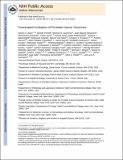| dc.contributor.author | Lander, Eric Steven | |
| dc.date.accessioned | 2016-04-15T19:54:35Z | |
| dc.date.available | 2016-04-15T19:54:35Z | |
| dc.date.issued | 2013-04 | |
| dc.date.submitted | 2013-01 | |
| dc.identifier.issn | 00928674 | |
| dc.identifier.issn | 1097-4172 | |
| dc.identifier.uri | http://hdl.handle.net/1721.1/102247 | |
| dc.description.abstract | The analysis of exonic DNA from prostate cancers has identified recurrently mutated genes, but the spectrum of genome-wide alterations has not been profiled extensively in this disease. We sequenced the genomes of 57 prostate tumors and matched normal tissues to characterize somatic alterations and to study how they accumulate during oncogenesis and progression. By modeling the genesis of genomic rearrangements, we identified abundant DNA translocations and deletions that arise in a highly interdependent manner. This phenomenon, which we term “chromoplexy,” frequently accounts for the dysregulation of prostate cancer genes and appears to disrupt multiple cancer genes coordinately. Our modeling suggests that chromoplexy may induce considerable genomic derangement over relatively few events in prostate cancer and other neoplasms, supporting a model of punctuated cancer evolution. By characterizing the clonal hierarchy of genomic lesions in prostate tumors, we charted a path of oncogenic events along which chromoplexy may drive prostate carcinogenesis. | en_US |
| dc.description.sponsorship | National Human Genome Research Institute (U.S.). Large Scale Sequencing Program (U54 HG003067) | en_US |
| dc.language.iso | en_US | |
| dc.publisher | Elsevier | en_US |
| dc.relation.isversionof | http://dx.doi.org/10.1016/j.cell.2013.03.021 | en_US |
| dc.rights | Creative Commons Attribution-Noncommercial-NoDerivatives | en_US |
| dc.rights.uri | http://creativecommons.org/licenses/by-nc-nd/4.0/ | en_US |
| dc.source | PMC | en_US |
| dc.title | Punctuated Evolution of Prostate Cancer Genomes | en_US |
| dc.type | Article | en_US |
| dc.identifier.citation | Baca, Sylvan C., Davide Prandi, Michael S. Lawrence, Juan Miguel Mosquera, Alessandro Romanel, Yotam Drier, Kyung Park, et al. “Punctuated Evolution of Prostate Cancer Genomes.” Cell 153, no. 3 (April 2013): 666–677. | en_US |
| dc.contributor.department | Massachusetts Institute of Technology. Department of Biology | en_US |
| dc.contributor.department | Whitehead Institute for Biomedical Research | en_US |
| dc.contributor.mitauthor | Lander, Eric S. | en_US |
| dc.relation.journal | Cell | en_US |
| dc.eprint.version | Author's final manuscript | en_US |
| dc.type.uri | http://purl.org/eprint/type/JournalArticle | en_US |
| eprint.status | http://purl.org/eprint/status/PeerReviewed | en_US |
| dspace.orderedauthors | Baca, Sylvan C.; Prandi, Davide; Lawrence, Michael S.; Mosquera, Juan Miguel; Romanel, Alessandro; Drier, Yotam; Park, Kyung; Kitabayashi, Naoki; MacDonald, Theresa Y.; Ghandi, Mahmoud; Van Allen, Eliezer; Kryukov, Gregory V.; Sboner, Andrea; Theurillat, Jean-Philippe; Soong, T. David; Nickerson, Elizabeth; Auclair, Daniel; Tewari, Ashutosh; Beltran, Himisha; Onofrio, Robert C.; Boysen, Gunther; Guiducci, Candace; Barbieri, Christopher E.; Cibulskis, Kristian; Sivachenko, Andrey; Carter, Scott L.; Saksena, Gordon; Voet, Douglas; Ramos, Alex H.; Winckler, Wendy; Cipicchio, Michelle; Ardlie, Kristin; Kantoff, Philip W.; Berger, Michael F.; Gabriel, Stacey B.; Golub, Todd R.; Meyerson, Matthew; Lander, Eric S.; Elemento, Olivier; Getz, Gad; Demichelis, Francesca; Rubin, Mark A.; Garraway, Levi A. | en_US |
| mit.license | PUBLISHER_CC | en_US |
| mit.metadata.status | Complete | |
